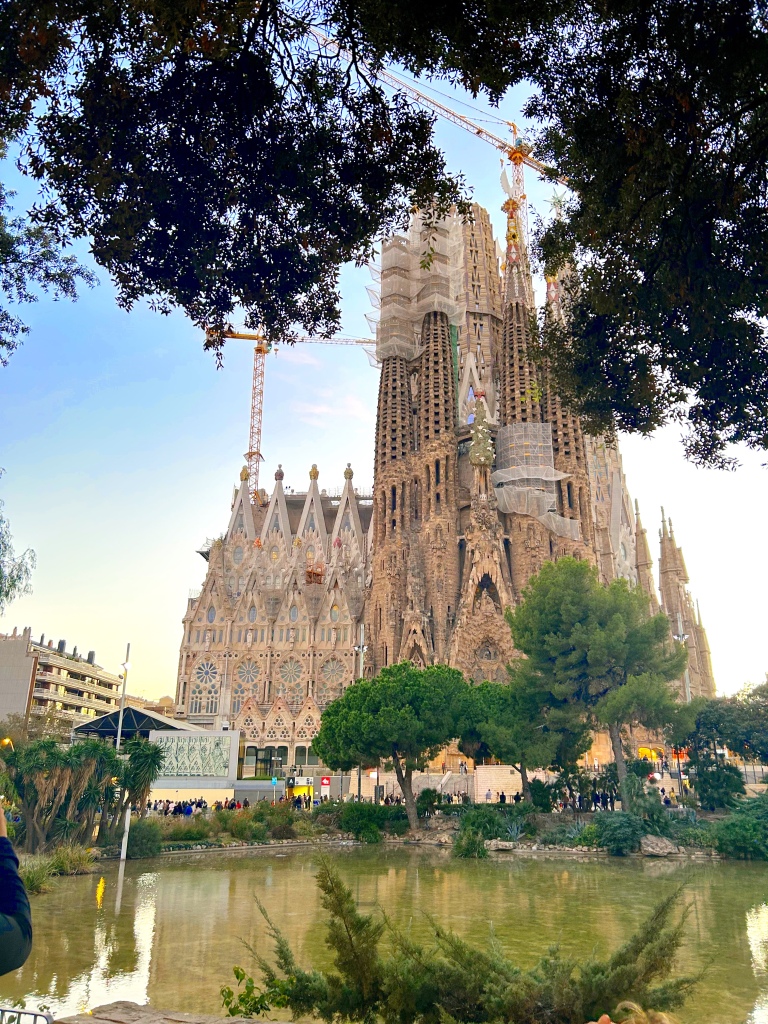By Georgia Renshaw
As a language student, a year abroad is compulsory, and you can choose to either study at a university, teach English, or complete an internship. After careful consideration, I decided to use my year abroad as an opportunity to gain some valuable experience in the marketing industry. Following various applications, interviews, and mock tasks, I successfully secured a 12-month paid marketing internship in Barcelona. And so, my year abroad journey began! I have now been in Barcelona for three months and thought it would be the perfect time to reflect on my adventure so far!
La Sagrada Familia
The Biggest Challenge
Securing my visa emerged as the most challenging hurdle I had to face. Brexit meant that many of the requirements had changed for Spanish internship visas, additional documentation was needed, and the overall cost of the visa process was amplified. Working full-time during the holidays and part-time during the academic year prepared me for some of the financial stress, however, there were certain challenges that could not have been predicted. For instance, I encountered setbacks such as the rejection of my work permit, the embassy’s dissatisfaction with one of my apostilles, and the consulate misplacing all of my visa-related documents… a very stressful few months to say the least. All of these visa challenges meant that I was unable to be in the office for the agreed start date, and therefore had to work remotely for the first two months. Despite the problems I faced, I am a strong believer of everything happening for a reason, and although at times it was difficult to remain in this mindset, I realise now that the entire pre-departure process taught me to stay determined and positive, even when things don’t go to plan.
The view from Los Bunkers del Carmel
Culture Shocks
One of the initial cultural shocks I experienced was related to the language. Before relocating to Barcelona, I was aware that there were two official languages, Castilian and Catalan. Although I have a good level of Castilian, thanks to my studies at Sheffield, I lacked any knowledge of Catalan, which was quite intimidating. However, the majority of locals are bilingual in both Castilian and Catalan, so don’t be discouraged if you only know one of the official languages. With time, I have actually managed to learn some basic Catalan and I have found that making an effort to speak Spanish, whether it be Castilian or Catalan, is met with immense respect, so don’t be scared to speak the language or make grammatical errors!
The Spanish way of life has been really inspiring – the relaxed atmosphere, great weather, and the friendliness of the people all contribute to an exceptional quality of life. However, one aspect that I am still adjusting to is the local concept of time; everything happens so much later. Attending the company Christmas meal, I intentionally arrived 45 minutes later, only for us to still wait an additional 30 minutes for others to arrive. The nightlife in Barcelona also follows a delayed schedule, with most clubs staying open until 6 am, making for quite an interesting night out!!
I am also adjusting to the reality that my schedule doesn’t allow me to have as much time off as those teaching English or studying at a university. In Sheffield, the holidays were a little break from work and a time for family and friends, however, I only have the national bank holidays off and then 11 days of my own personal leave, making it slightly difficult to completely detach from work and have affordable city breaks away. Nonetheless, my job is still thoroughly rewarding, I just have to make the most of my weekends!
Parc de la Ciutadella
Hopes For the Next Few Months
Now that I’ve settled into both the city and my job, my aim for the upcoming months is to explore more of Europe! My TIE card will be available to collect at the end of January, which will allow me to leave and re-enter Spain without any issues, so I can finally start planning group and solo trips without worrying about any challenges at the border. One of the main places on my bucket list for my year abroad is to visit Morocco, as it’s not that far from Spain, so hopefully I’ll be writing about that trip in one of my next blogs!
La Barceloneta Beach
Tips and Advice
- Visa – Stay updated with the consulate website and make sure you have all of the correct documentation, be prepared for it to get costly (translations, apostles etc), and don’t be disheartened if things go wrong – it’ll all be worth it once you’re on your year abroad.
- Interning Abroad/ Imposter Syndrome – I’ll be honest, it is daunting working in a foreign office and being the ‘newbie’, but remember that you deserve to be there and the company offered you a position for a reason! View it as an incredible opportunity to gain valuable experience, acquire new skills, and expand your network.
- Homesickness – While I haven’t personally experienced much homesickness in my first three months, it does surface occasionally. To counter this, I remind myself that this is an incredible opportunity to grow, both professionally and personally!
- My biggest piece of advice would be to remind yourself that this opportunity could be a once-in-a-lifetime experience, so make the most of it! Carefully consider your year abroad options and don’t be scared to diverge from what your friends are doing, everything will work out the way that it’s meant to!
- For those considering an internship abroad, I wholeheartedly recommend it. My experience has been incredible so far, providing me with a full year of valuable industry exposure that will benefit my post-graduation career. Whether you decide to complete an internship, study at a university, or teach English at a school, your year abroad promises a truly enriching experience!
- If you have any questions about my experience as an intern abroad, life in Spain, or you want some advice for your year abroad, feel free to message me via The Ambassador Platform (you can access this via the Global Opportunities website).
FC Barcelona Match



